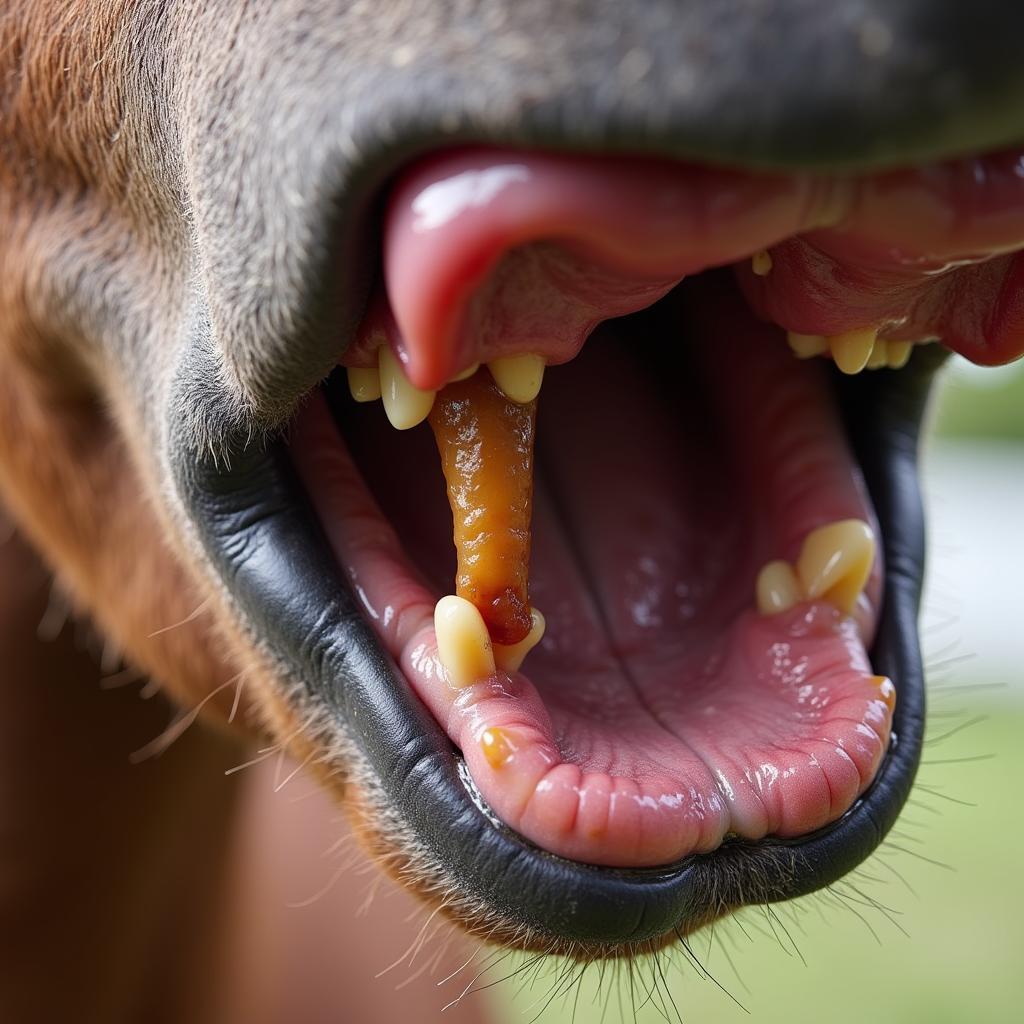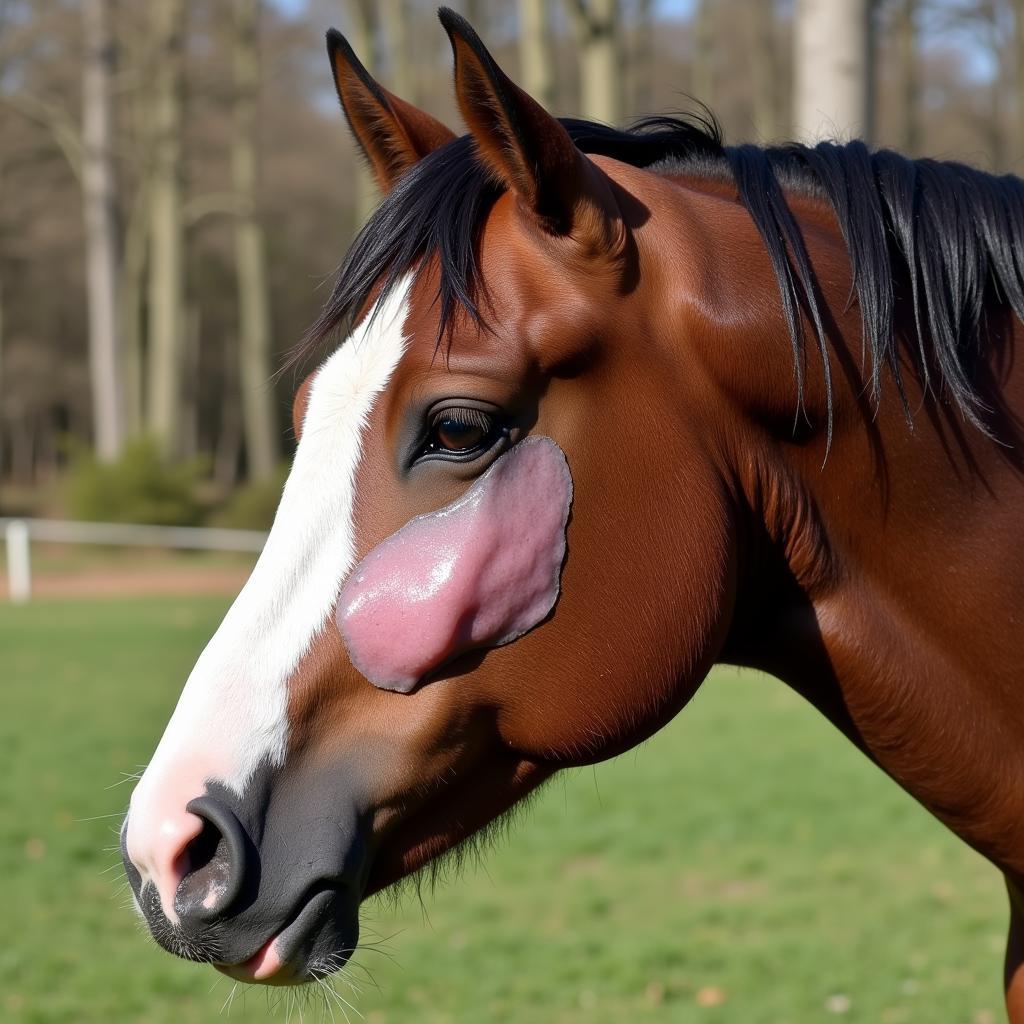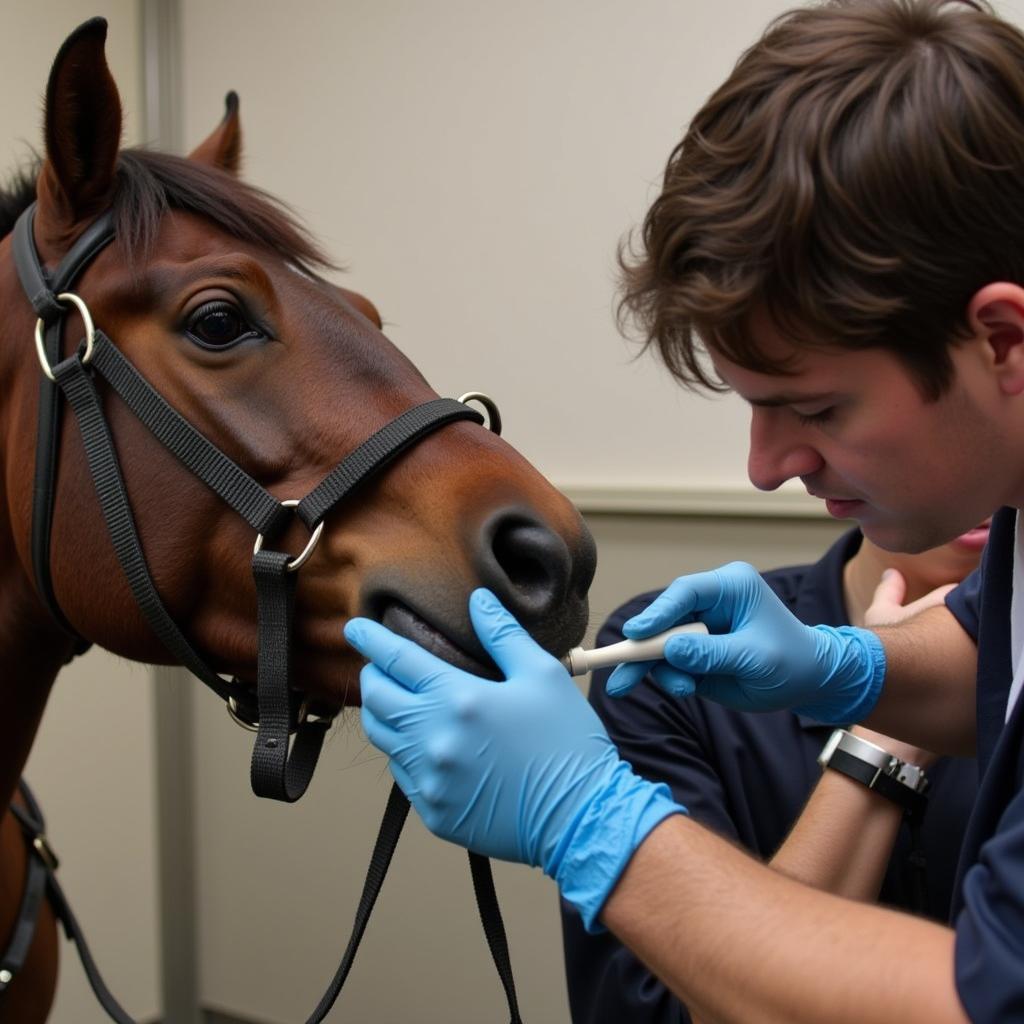A tooth root abscess in horses is a serious condition that can cause pain, swelling, and even facial deformities if left untreated. It occurs when bacteria enter the tooth root, leading to an infection and a build-up of pus within the tooth or surrounding jawbone. Recognizing the signs early and seeking prompt veterinary attention is crucial for the horse’s well-being and long-term health.
Understanding Tooth Root Abscesses in Horses
Equine dental health is often overlooked, but it plays a vital role in a horse’s overall health and quality of life. Just like humans, horses can experience dental problems, and tooth root abscesses are a particularly painful condition that requires immediate attention.
A tooth root abscess develops when bacteria invade the pulp of the tooth, which is the soft tissue containing blood vessels and nerves. This usually occurs due to tooth decay, trauma, or gum disease. As the infection progresses, pus accumulates, causing intense pain and swelling.
 Horse Tooth Root Abscess
Horse Tooth Root Abscess
What Causes Tooth Root Abscesses in Horses?
Several factors can contribute to tooth root abscesses in horses, including:
- Dental Fractures: A cracked or broken tooth can create an entry point for bacteria to reach the pulp.
- Periodontal Disease: Gum disease, also known as periodontal disease, can damage the tissues surrounding the teeth, making it easier for bacteria to invade the tooth root.
- Retained Caps: Young horses naturally lose their baby teeth, or “caps,” as their permanent teeth erupt. Sometimes, these caps don’t shed properly, leading to inflammation and infection.
- Malocclusion: Misaligned teeth or an improper bite can cause uneven wear and tear, increasing the risk of fractures and infections.
Recognizing the Signs: Symptoms of a Tooth Root Abscess
Horses suffering from a tooth root abscess may exhibit a range of symptoms, including:
- Facial Swelling: One of the most noticeable signs is swelling on the side of the face where the abscess is located.
- Nasal Discharge: A foul-smelling discharge, often containing pus or blood, may drain from one or both nostrils.
- Difficulty Chewing: Horses with a tooth root abscess may have difficulty chewing their food, drop food, or tilt their head while eating to avoid pain.
- Weight Loss: Pain and difficulty eating can lead to weight loss over time.
- Behavioral Changes: Some horses may become head shy, reluctant to be touched around the face, or show signs of discomfort during bridling or riding.
 Horse with Facial Swelling from Abscess
Horse with Facial Swelling from Abscess
Diagnosing Tooth Root Abscesses
If you suspect your horse has a tooth root abscess, it’s crucial to contact your veterinarian immediately. Here’s what you can expect during the diagnosis:
- Physical Exam: Your veterinarian will begin with a thorough physical examination, paying close attention to the horse’s head, mouth, and lymph nodes.
- Oral Examination: A speculum, an instrument that holds the horse’s mouth open, will allow the veterinarian to examine the teeth and gums for signs of an abscess.
- Dental X-rays: X-rays are essential to confirm the diagnosis and determine the extent of the infection. They can reveal the location and severity of the abscess, as well as any bone involvement.
“Early detection is key when it comes to tooth root abscesses in horses,” says Dr. Emily Carter, an equine veterinarian with over 15 years of experience. “The sooner we can diagnose and treat the abscess, the better the chances of a full recovery for the horse.”
Treatment Options for Tooth Root Abscesses in Horses
Treatment for tooth root abscesses typically involves a multi-pronged approach to eliminate the infection, alleviate pain, and promote healing. The specific treatment plan will depend on the severity of the abscess and the overall health of the horse. Common treatment options include:
- Antibiotics: Antibiotics are prescribed to combat the bacterial infection. The type and duration of antibiotic treatment will vary depending on the severity of the infection.
- Flushing the Abscess: Your veterinarian may flush the abscess with an antiseptic solution to remove pus and debris, promoting drainage and healing.
- Pain Relief: Nonsteroidal anti-inflammatory drugs (NSAIDs) are often prescribed to reduce pain and inflammation.
- Extraction: In severe cases, where the tooth is extensively damaged or the abscess is chronic, tooth extraction may be necessary. This procedure is typically performed under sedation and local anesthesia.
Preventing Tooth Root Abscesses in Horses
Prevention is always better than cure, and there are several steps horse owners can take to reduce the risk of their equine companions developing tooth root abscesses:
- Regular Dental Checkups: Horses should receive a comprehensive dental examination by a qualified equine veterinarian or dental technician at least once a year. Senior horses or those with a history of dental problems may require more frequent checkups.
- Proper Nutrition: A balanced diet that is low in sugar and high in forage is essential for maintaining good dental health.
- Dental Care: Providing horses with appropriate chew toys can help promote natural wear and keep their teeth clean.
 Veterinarian Examining Horse Teeth
Veterinarian Examining Horse Teeth
Long-Term Outlook and Recovery
With prompt and appropriate treatment, the prognosis for horses with tooth root abscesses is generally good. Most horses recover fully and can return to their normal activities. However, it’s important to note that tooth root abscesses can recur, especially if the underlying cause is not addressed.
Regular dental care, including annual checkups and prompt attention to any dental issues, is crucial for maintaining the long-term health and well-being of horses. By staying proactive and vigilant, horse owners can help their equine companions enjoy a lifetime of good dental health.
FAQs about Tooth Root Abscesses in Horses
1. Can a horse survive a tooth root abscess?
Yes, with proper treatment, most horses can survive and recover fully from a tooth root abscess. However, if left untreated, the infection can spread to other parts of the body, leading to serious complications.
2. How long does it take for a tooth root abscess to heal in a horse?
The healing time for a tooth root abscess in a horse varies depending on the severity of the infection and the chosen treatment. Generally, it can take several weeks to a few months for the abscess to resolve completely.
3. What are the signs that a tooth root abscess is healing in a horse?
Signs of healing include a reduction in swelling, decreased nasal discharge, improved appetite, and a return to normal behavior.
Need Help with Your Horse’s Dental Health?
If you have any concerns about your horse’s dental health or suspect a tooth root abscess, don’t hesitate to reach out to our team of experts. Contact us today at Justus Horses USA:
Phone Number: 0772127271
Email: [email protected]
Address: QGM2+WX2, Vị Trung, Vị Thuỷ, Hậu Giang, Việt Nam.
We offer 24/7 customer support to address all your equine needs.